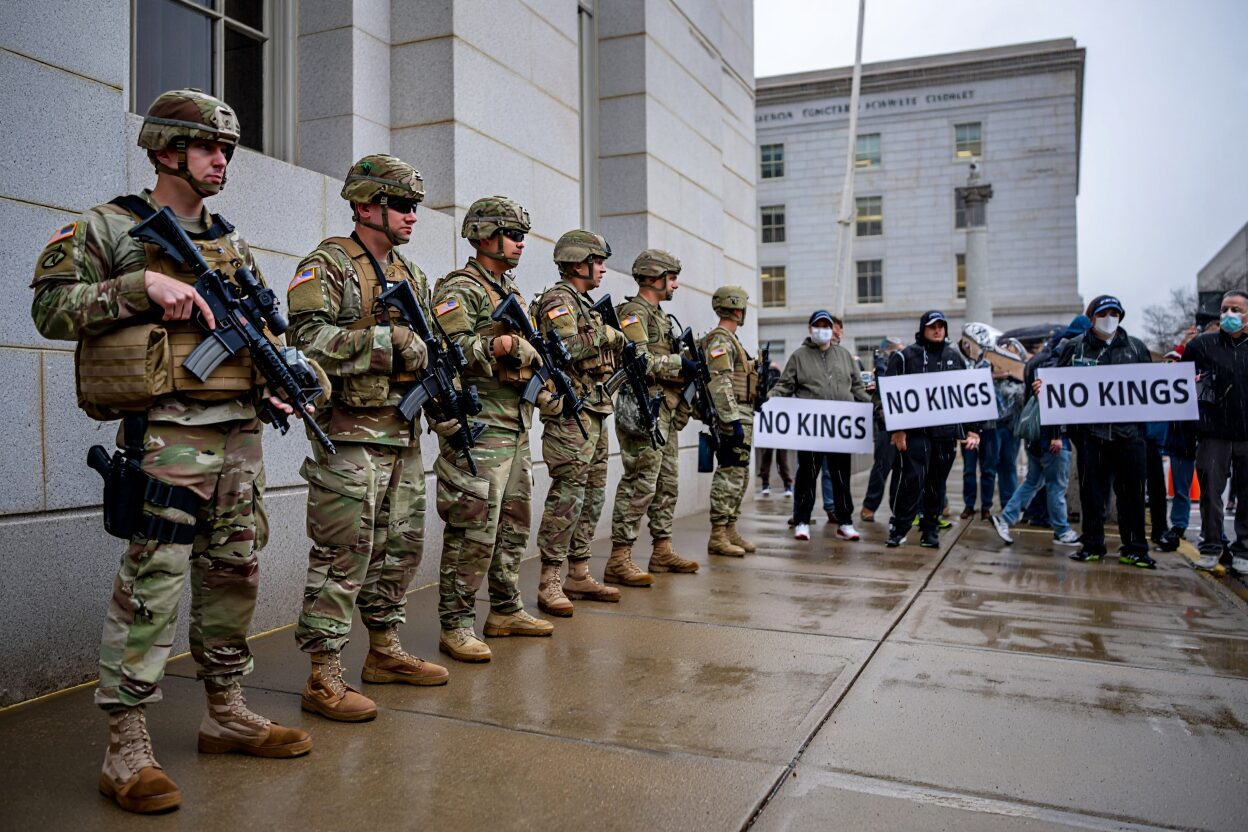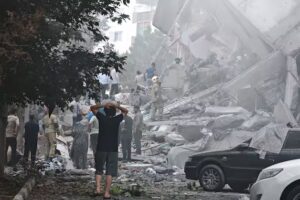INDIANAPOLIS – This Saturday morning, America awakens to a nation cleaved in two, grappling with a disorienting, split-screen reality. On one channel, the surreal spectacle of tanks and armored vehicles, summoned at the whim of the President, is set to roll down the streets of the nation’s capital in a military parade that even his own former generals once warned is “what dictators do.” On another, a war of breathtaking speed and lethality rages in the Middle East, threatening to pull the globe into its vortex. And obscuring it all, a massive weather system is unleashing torrential rain across half the country, a literal fog of war that threatens to wash away the public’s attention to either crisis.
These events—the parade, the protests, the war, the storm—are not a confusing confluence of unrelated misfortunes. They are a singular, coherent story. It is the story of a President, unbothered by the norms he has shattered, waging a two-front war: one abroad, where he can play the reluctant peacemaker on a stage set by others, and a far more insidious one at home, against the very foundations of American civil society. This week, the front line of that domestic war was in Los Angeles.
What began as protests against a series of aggressive immigration raids by the Felonious Punk administration rapidly devolved into a case study in federal overreach. Against the express wishes of California’s governor, the President federalized the state’s National Guard and, in a move almost unheard of since the civil rights era, deployed active-duty U.S. Marines to the streets of an American city. The administration’s justification was to quell unrest. Still, the actions that followed revealed a deeper, more chilling motive: the suppression of dissent and the normalization of military force against American citizens.

The crisis reached its symbolic apex on Thursday with the forcible removal of a sitting United States Senator, Alex Padilla, from a Department of Homeland Security press conference. When he attempted to ask a question, federal agents physically shoved him, forced him to the ground, and handcuffed him. It was a shocking, physical assault on the separation of powers, an act of political thuggery that treated a member of a co-equal branch of government as an enemy combatant.
If Senator Padilla’s removal was the assault on the political order, the events of Friday were the assault on the nation’s soul. In an incident that should send a tremor through every American household, U.S. Marines detained Marcos Leao, a 27-year-old immigrant who had earned his American citizenship by serving in the U.S. Army. Mr. Leao was not a protester. He was, by his own account, simply trying to visit a Veterans Administration office inside the federal building the Marines were guarding. In the calculus of this new domestic deployment, an Army veteran seeking earned benefits was indistinguishable from an enemy of the state. He was zip-tied and detained by the military he had once served alongside.
This is the inevitable outcome of a long and deliberate politicization of the armed forces. As reporting from The New York Times makes clear, Felonious Punk’s presidency has been defined by a deep contradiction: he loves the aesthetic of military power, the uniforms, the jets, the “pomp and circumstance”—while holding a profound disdain for the non-partisan service ethos that underpins it. He famously chafed at generals like John Kelly who were loyal to the Constitution before him, reportedly asking, “Why can’t you be like the German generals?”—a reference to Hitler’s command.
Now, with those dissenting voices purged, the President is free to indulge his impulses. He uses West Point and Fort Bragg as backdrops for campaign-style rallies, encouraging troops to cheer his partisan attacks. And he has finally gotten the military parade he has coveted since being impressed by France’s Bastille Day celebration. The tanks on Pennsylvania Avenue are not a celebration of the Army’s 250th birthday; they are a celebration of his own power, a personal monument built with the hardware of the republic.
Yet, as the administration wages its war on dissent at home, the American body politic has mounted its own immune response. Today, in over 2,000 cities, a massive, nationwide protest movement dubbed the “No Kings Nationwide Day of Defiance” is scheduled to take place. Organizers expect millions to participate, from 100,000 marching down Fifth Avenue in New York to 70,000 at the foot of Los Angeles City Hall. It is a powerful, grassroots rebuke, a visual juxtaposition to the state-sponsored spectacle in Washington. Its purpose is not necessarily to change the President’s mind, but to provide political cover for institutional opposition and, crucially, to create an indelible historical record of resistance. It is a declaration that the American people will not silently acquiesce to the pageantry of autocracy.

Into this maelstrom of domestic conflict comes the convenient distraction of a foreign war. The timing of Israel’s devastating decapitation strike on Iran—eliminating much of its senior military and scientific command—could not have been more politically fortuitous for an administration mired in a scandal over its use of the military at home. The war in Iran is the ultimate shiny object for a nation of distracted crows. It is loud, explosive, and carries the real risk of global escalation.
The President’s posture toward this conflict lays his political calculations bare. After years of threatening Iran with “obliteration,” he has taken a backseat, urging a return to negotiations while U.S. forces provide defensive aid to Israel. This apparent restraint is not born of a newfound love for diplomacy. It is a concession to his isolationist base, which has loudly warned against another “endless war.” He is more willing to deploy the U.S. military against the citizens of Los Angeles than against the military of Iran because the political cost of the former is, to him, nonexistent. In contrast, the cost of the latter could be catastrophic to his coalition.
The great storm system sweeping the nation today will physically suppress some of the dissent, washing out protests and pulling the public’s immediate focus to the safety of their own homes. But it cannot wash away the events of this week. It cannot erase the image of a U.S. Senator being handcuffed, or an Army veteran being detained by his own military.
When the storm passes and the smoke from the Middle East finds a tentative equilibrium, this is the story that will remain. The true test of a republic is not whether it faces crises, but which crises it chooses to remember. The war abroad is urgent, but the war on democratic norms at home is foundational. The most patriotic act of this weekend may not be watching a parade, but ensuring that the history of this moment is written with unflinching clarity.
Discover more from Clight Morning Analysis
Subscribe to get the latest posts sent to your email.










